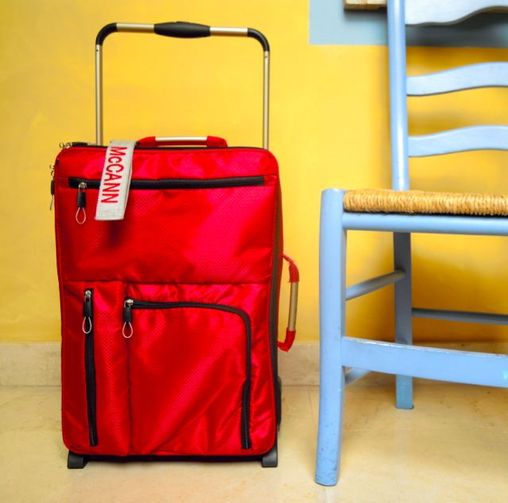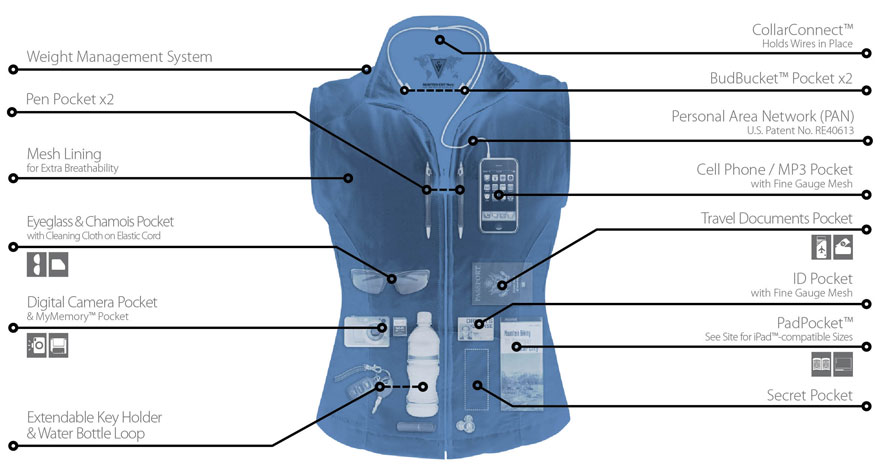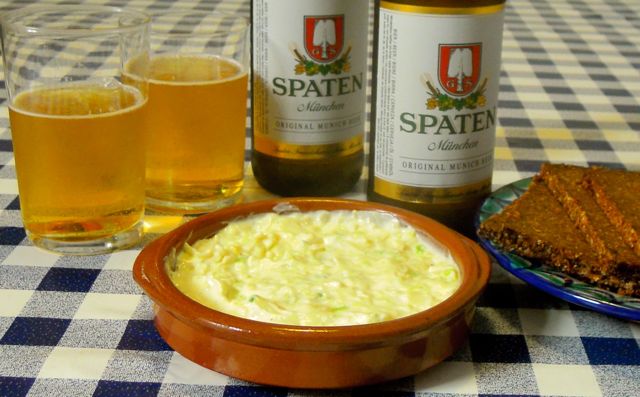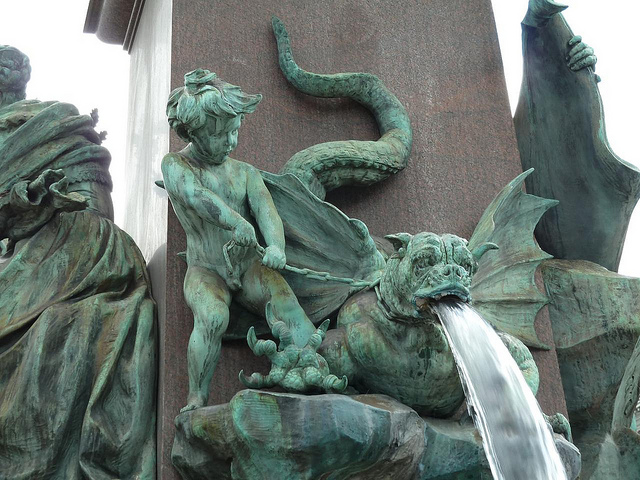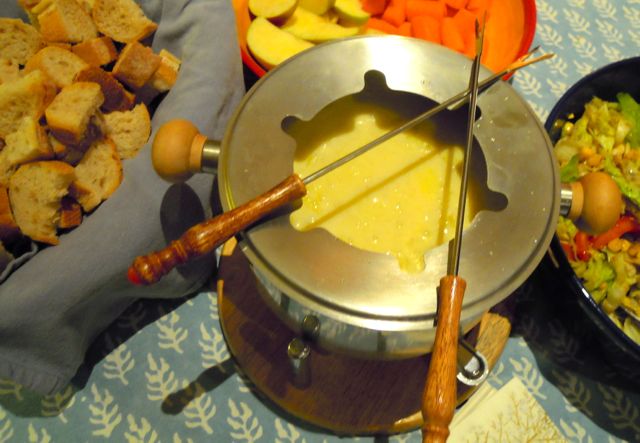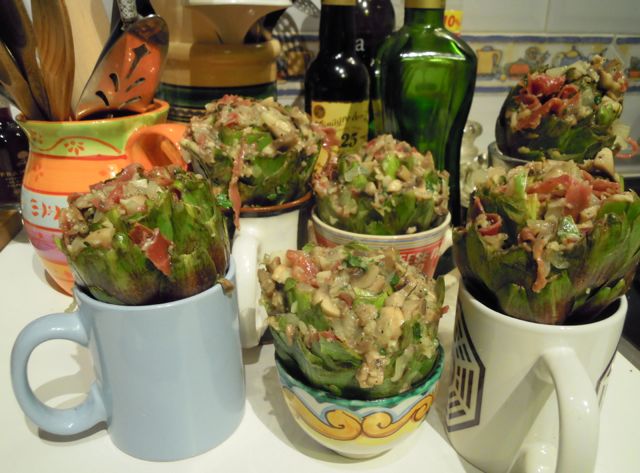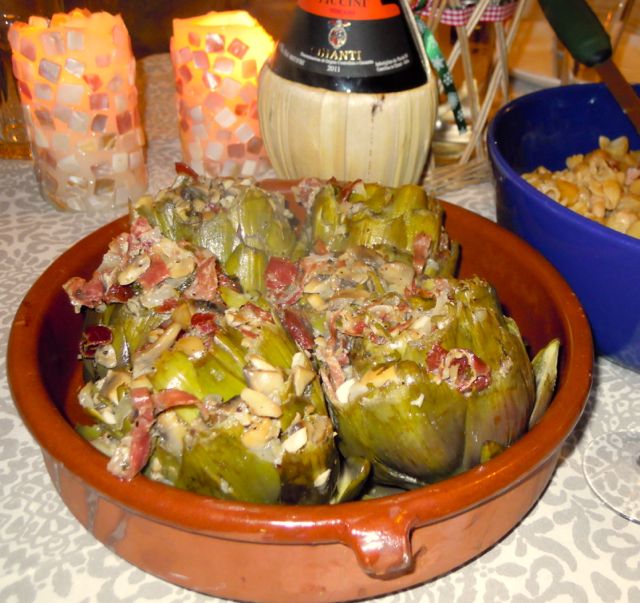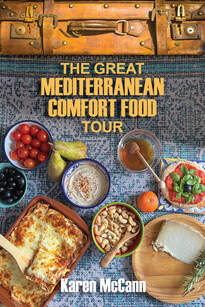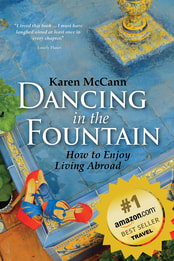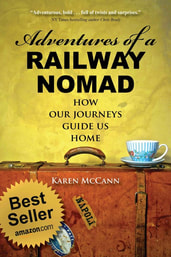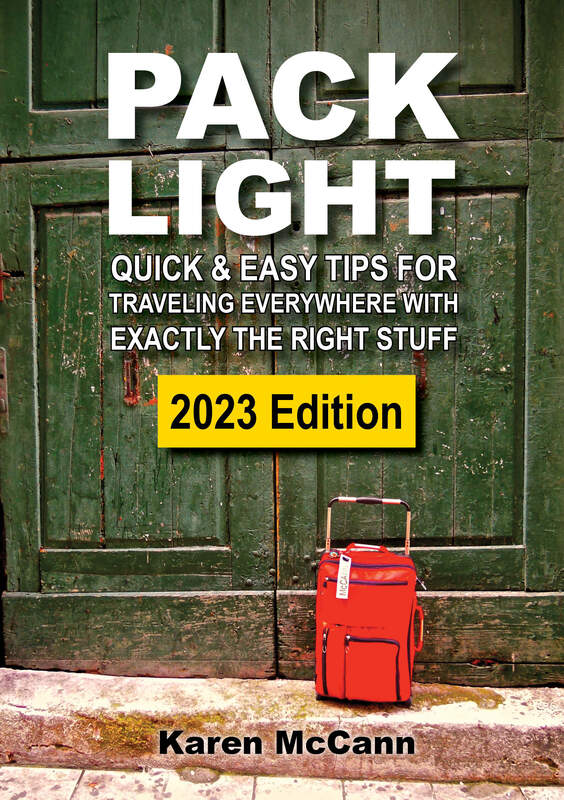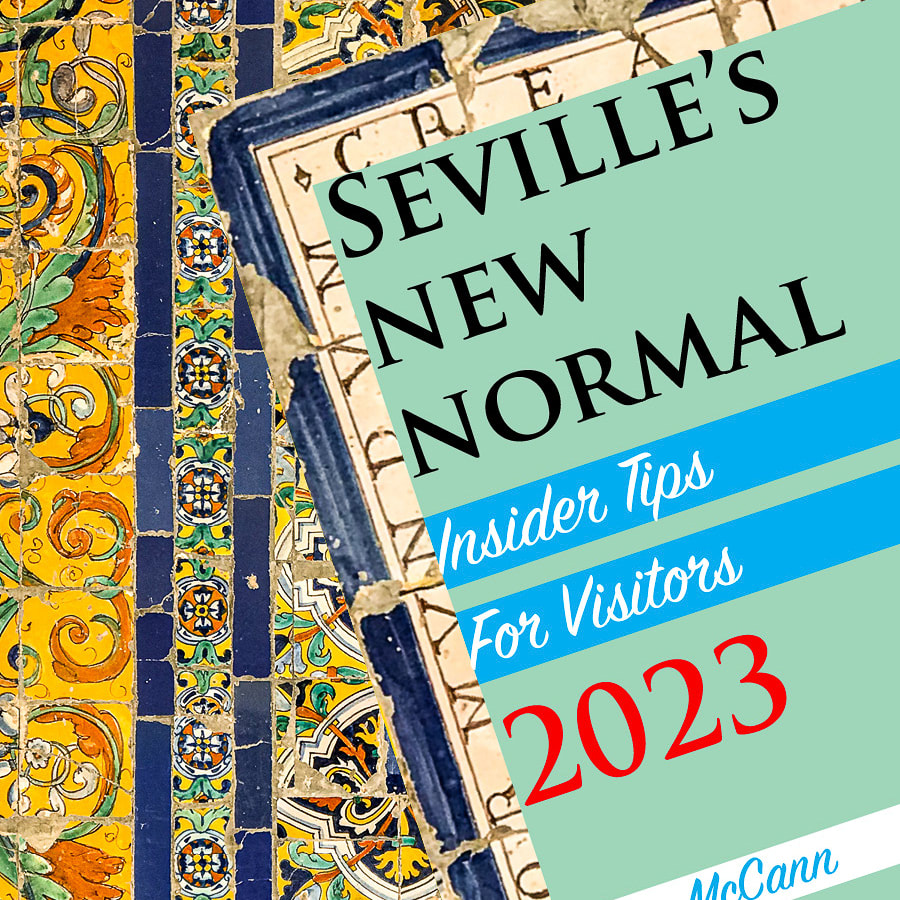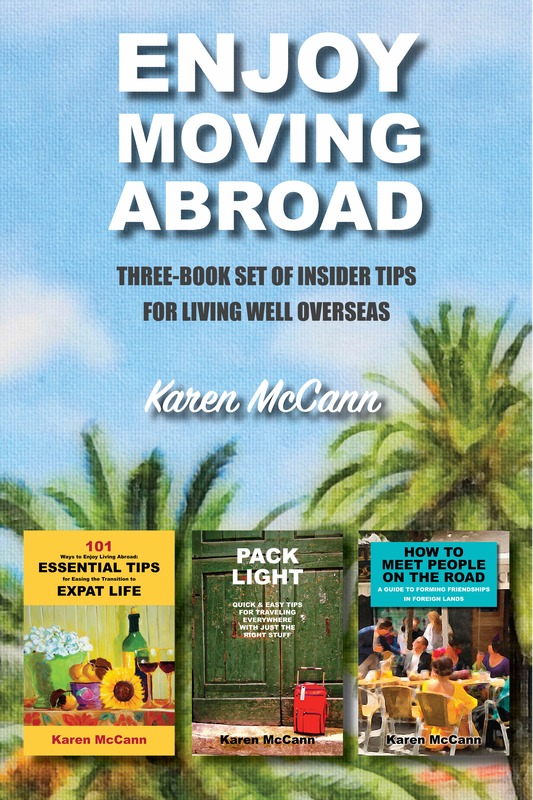|
Next summer, Rich and I will walk out our door in Seville, stroll to the train station with our rolling luggage, and board a train to begin a journey that will last several months and cover thousands of miles. No reservations, just a Eurail pass and an iPad full of information about possible destinations. We'll wend our way by easy stages through Central and Eastern Europe, winding up in Transylvania and some of the more obscure Balkan countries, seeking offbeat side trips and adventures, passing through just about every type of terrain and climate Europe has to offer. So how are we packing for this? I'm glad you asked. In the cult classic Hitchhiker’s Guide to the Galaxy, Arthur and Ford take off into the universe carrying nothing but a towel and an electronic guide book, both of which come in extremely handy for them. 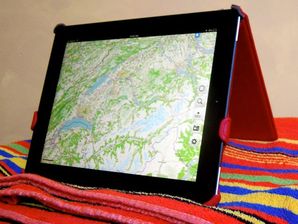 For our big trip next summer, Rich and I will be packing a towel and an iPad – which is strikingly like the Hitchhiker’s Guide to the Galaxy except that it doesn’t have “Don’t Panic” written across it in large, friendly letters (although I may add this along the way). Like Arthur and Ford, we travel light. Rich always says: “The first rule of packing is to lay out all your clothes and all your money, then take half the clothes and twice the money.” The second rule: choose the right suitcase. Not many people know this, but Rich has a luggage fetish. He adores shopping for suitcases, and even if we haven’t the remotest intention of purchasing one, he finds it almost physically painful to bypass a promising luggage shop anywhere in the world. In moments of extreme stress, I can always turn his thoughts to a more cheerful direction by casually remarking, “I saw a suitcase today that might interest you...” When it comes to luggage, less is definitely more. We’ll constantly be hauling ours on and off trains and dragging it up and down stairs in hotels too old and quaint to boast an elevator. That’s why we’ve chosen ultra-light IT-0-1 suitcases from an Austrailian company called it luggage. It claims this is “officially the world’s lightest 2-wheeled case,” and I can attest it’s the lightest we’ve found. Mine (a slightly older model) is 54 x 34 x 19 cm (21 x 13 x 7.5 inches) and weighs a very modest 1.8 kilos (4 lbs.). As to purses, I’ve gone from lightweight to none at all. In an effort to foil would-be pickpockets, I’ll be carrying my smaller necessities in a cunning black vest with 17 pockets, most of which are cleverly concealed on the inside. It’s amazing how much you can pack in one of these vests (Kindles! Water bottles!) if you don’t mind looking a trifle chubbier. My biggest problem is remembering what goes in which pocket. Luckily, Scottevest provides a diagram to get you started. Rich bought Koyono’s Classic Genius Travel Coat. Although it comes with a mere 14 pockets, it does have a zip-out liner and lots of other cool features. Including its own video. One pocket is specially designed to carry an iPad (or your Hitchhiker’s Guide to the Galaxy) and no doubt there is room in there somewhere for a towel or two. Rich has never been happier. Not only does he get to wheel around the latest in high-tech luggage, now he’s wearing it as well.
This post was written in response to the many questions we've been asked about how to pack for such a long and varied trip. Unlike some of our better-organized and more practical blogger friends, we haven't obtained free or discounted gear in return for promoting anything on this blog. We're just letting you know what products we consider to be the most useful for our kind of travel. Watch for future posts about the garments, gear and gadgets we'll be packing!
12 Comments
Next summer, Rich and I will walk out our door in Seville, stroll to the train station with our rolling luggage, and board a train to begin a journey that will last several months and cover thousands of miles. No reservations, just a Eurail pass and an iPad full of information about possible destinations. We'll wend our way by easy stages through Central and Eastern Europe, winding up in Transylvania and some of the more obscure Balkan countries, seeking offbeat side trips and adventures. A few days ago, Rich asked if I'd like to take the direct route from Zurich to Munich or the slower train along the Austrian-German border into the Tyrolian Alps. The Tyrolian Alps. The moment I heard those words I was transported back to my childhood, when my brothers and I discovered yodeling. With kids’ uncanny knack for knowing what will drive parents insane, we began yodeling at one another down the stairs, across the lawn and up the street at the top of our young lungs. No recordings were made (I can’t imagine why) but this YouTube video kind of captures the spirit. Sometimes I wonder how anyone makes it to adulthood without being strangled by their family or neighbors. We figured our yodeling skills, such as they were, were inherited from our maternal grandfather’s German forebears. For a brief time I was entranced by lederhosen, too, despite my mother’s hints that girls were supposed to prefer dirndl skirts. There’s something rugged, romantic yet faintly goofy about lederhosen that has proved irresistible – not only to me, but to generations of American kids. Some of these kids grew up to become filmmakers, leading, perhaps inevitably, to Chevy Chase’s famous “chicken dance” scene in European Vacation. After watching this, one fan wrote in on YouTube, “I dance like this_ sometimes in Nightclubs and I always get thrown out or end up in Hospital I gotta stop taking movies to seriously problem is someone bumps into me I slap them then they try to hit me and as you know the rest is history these days I usually dont go out that often because of the problems I have had in the past.” I think that’s a good call, sir. Another wonderful lederhosen movie moment – and one that’s equally inadvisable to imitate in bars – is the satirical “Springtime for Hitler” scene from the 1968 cult classic The Producers. Now that my tastes have matured (yes they have!), I’m more interested in German beer than in lederhosen or yodeling. It’s not always easy to find foreign brews here in Seville, but I managed to track down a couple of bottles of Spaten that had arrived from München. To go with it, I decided to make the popular bier hall snack, obatzda. Somewhere between a dip and a spread, it includes creamy cheeses, onions, chives, a splash of beer, a pinch of caraway seed ... Paired with a frosty Spaten, it's a combination made in heaven. So to recap: Wherever we wind up in Germany and/or Austria, I will refrain from yodeling, donning lederhosen, doing the chicken dance or enacting any part whatsoever from “Springtime for Hitler.” And I will be ordering “ein bier und obatzda,” at the first opportunity.
Next summer, Rich and I will walk out our door in Seville, stroll to the train station with our rolling luggage, and board a train to begin a journey that will last several months and cover thousands of miles. We won't have reservations anywhere, just a Eurail pass and an iPad full of information about possible destinations. We'll wend our way by easy stages through Central and Eastern Europe, winding up in Transylvania and some of the more obscure Balkan countries, seeking offbeat side trips and weird, wonderful stories and adventures. The route is subject to change, but right now we're thinking one of our stops will be Zurich. Zurich is consistently ranked the best place on the planet to live; it’s clean, healthy, wealthy, beautifully organized, committed to social ideals, politically stable, has 3.2% unemployment and recycles everything from PET plastics to pet cadavers. Garbage, incinerated in a non-polluting way, provides part of the region’s power supply. All 1200 of the city’s fountains serve up drinkable water, and the river water is so clean that even sensible people choose to swim in it. (People swim in Seville’s Guadalquivir River, too, but it nearly always involves alcohol and a lost bet.) Despite its squeaky-clean reputation, it turns out Zurich has a distinctly risqué side. “Sex shops and naughty bars are dotted everywhere,” writes Nora Dunn, on her Professional Hobo blog, “seemingly regardless of neighbourhood demographic; sometimes they’re next to toy stores, sometimes they’re set up as massive standalone warehouse-sized megastores. And browsing through the local classifieds reveals a fairly active culture with various types of clubs catering to the sexually liberated.” I doubt that I’ll take advantage of the opportunity to sample the fifty shades of Zurich, unless of course I give in to the temptation to eat fondu. Like most people, I love dipping bread into hot melted cheese with a long fork. But I have just learned, from a friend who visited Zurich a few years ago, that according to her Swiss hostess, if the bread falls off your fork into the fondu, you’re supposed to take off all your clothes and run naked through the house. My friend, normally a stickler for being a compliant guest, repeatedly refused all pressure to do this (or so she says).
Zurich is probably the only place in the world where dipping bread into melted cheese counts as taking a walk on the wild side. Looking forward to making your acquaintance, Zurich! Next summer, Rich and I will walk out our door in Seville, stroll to the train station with our rolling luggage, and board a train to begin a journey that will last several months and cover thousands of miles. We won't have any reservations anywhere, just a Eurail pass and an iPad full of information about possible destinations. We'll wend our way by easy stages through Central and Eastern Europe, winding up in Transylvania and some of the more obscure Balkan countries, seeking offbeat side trips and weird, wonderful stories and adventures. We hope to connect up with locals and expats all along the way. If you know someone in one of our destination areas – even better, if you ARE someone in one of our destination areas – send us an email and we'll see about meeting up. I'll post a map when we've firmed up the general route. We have decided to begin by taking the train to Barcelona, then the ferry across to Genoa, Italy. And here's what I've learned about that destination city... Nearly every Genoa tourism website starts off by pleading, “Please don’t rush through here on your way to Florence or Rome. No matter what you’ve heard about us, we really are worth a visit! Really! Please say you'll stay!!!” OK, I’m paraphrasing a little, but that’s the gist. Apparently Genoa is the Newark of Italy, a place most people arrive in only to depart as quickly as possible for more glamorous destinations.  So what does Genoa have to offer? It's a gorgeous old city with lots of historic buildings and museums, promoted with such awkwardly translated prose as: “Thought then to the birthplace, even though few of them remembered their location, so that at first it was a walled marble plaque in memory above the entrance of a building facing.” Hard to understand how that could fail to entice tourists... Struggling through the prose, I discovered some real (or possibly fake) gems. For instance, the Museum of the Cathedral of San Lorenzo houses the actual platter on which Salome placed the head of John the Baptist after his decapitation. Now THAT’S something worth seeing! Naysayers may question its authenticity, but I for one am ready to believe. The museum also contains the Ark of the Ashes of John the Baptist, a splinter of the True Cross, and a chalice that was believed to be the Holy Grail when it was brought back from the Holy Land by a crusader. It’s easy to scoff at such ignorance today, now that we all know the Holy Grail was actually found by Indiana Jones. While some of its ancient relics may be suspect, Genoa does boast a genuine haunted house. Now known as the Ca ‘de Anime (House of Spirits), back in the 18th century it was an inn situated on a lonely road outside of town. 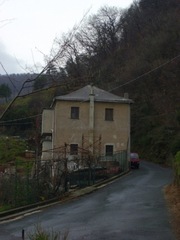 The genial hosts were a family of robbers who killed their richer guests, relieved them of their possessions and buried the bodies nearby. The mysterious disappearances of so many of the inn’s patrons gave rise to rumors that the inn was haunted, but investigators later exposed the guilt of the robber family and executed them all on the spot. That's when the real haunting began... The inn remained vacant until a desperate family moved in during World War II. The new occupants managed to ignore mysterious sounds and inexplicable broken objects around the house, but when a strange girl seemed to materialize out of the 18th century, they fled the house never to return. Rich and I will be reviewing The Exorcist and Poltergeist in preparation for the visit. But what about modern Genoan life? The region is famous for its salami and pesto, but what other pleasures could we expect at the Genoan table? I discovered Giada De Laurentiis' wonderful recipes for two regional favorites, Orichiette with Sausage, Beans and Marsarpone and Genovese-style Artichokes. The orichiette (pasta shaped like little ears) was delicious, but the true hit of the evening was the artichoke dish. We stuffed the artichokes with a mixture of garlic, onion, ham (we substituted good Spanish jamon for the prosciutto), Parmesan cheese and parsley. Then we put them in a deep pot, wedged together to say upright in a pool of white wine, and let them simmer 45 minutes on the stovetop until they were tender and had soaked up the wine flavor. Rich and I decided that Genoa may have its issues with public relations, artifact authentication and online translation programs, but when it comes to the pleasures of the table, it’s a city second to none. Looking forward to making your acquaintance, Genoa!
If you know someone living in Genoa – even better, if you are living in Genoa yourself – send us an email and we'll see about meeting up. We're looking for insider information about the city and its quirkier aspects. First round of drinks is on us. |
This blog is a promotion-free zone.
As my regular readers know, I never get free or discounted goods or services for mentioning anything on this blog (or anywhere else). I only write about things I find interesting and/or useful. I'm an American travel writer living in California and Seville, Spain. I travel the world seeking eccentric people, quirky places, and outrageously delicious food so I can have the fun of writing about them here.
My current project is OUT TO LUNCH IN SAN FRANCISCO. Don't miss out! SIGN UP HERE to be notified when I publish new posts. Planning a trip?
Use the search box below to find out about other places I've written about. Winner of the 2023 Firebird Book Award for Travel
#1 Amazon Bestseller in Tourist Destinations, Travel Tips, Gastronomy Essays, and Senior Travel
BLOG ARCHIVES
July 2024
CATEGORIES
All
|
